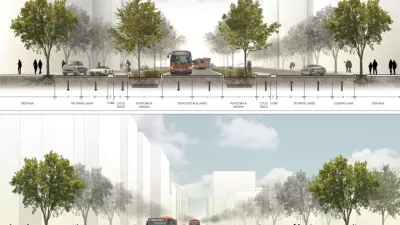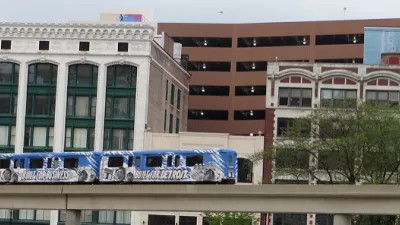The Netflix show Patriot Act, starring Hasan Minhaj, assigns blame for the current state of public transit.
A new episode of Patriot Act with Hasan Minhaj was published today to YouTube that examines with
The episode opens with Minhaj attempting to take public transit to the show in New York City, only to have a bus never show, and a train get delayed for a multiple reasons, until the conductor finally just tells riders "your wife won't remember you."
In the opening monologue, Minhaj says public transportation isn't just destroying his life, "everyone hates public transportation." An article published by CityLab in 2015 gets a shout out to back up that point—the article cites research by USC Professor Lisa Schweitzer published in the Journal of the American Planning Association.
Minhaj, however, quickly expresses his support for the potential for public transit to be a tremendous benefit, citing a 2015 study that links better transportation as the most effective tool for improving economic mobility, and his regret that transit is experiencing a death spiral of reduced ridership, reduced service, and increased fares—each leading to more of the other.
Then, Minhaj gets into the causes for driving's dominance and public transit's decline: the list includes zoning laws, but the focus of the show is devoted to "hidden forces" that want Americans in cars instead of transit. "American Public Transit Is Under Attack" proclaims the show at about 6:43 in the video.
The culprits include the Americans for Prosperity, funded by the Koch brothers—the latter group has recently defeated a transit funding initiative in Nashville and helped get an anti-transit initiative onto the ballot in Phoenix. Minhaj also mentions how the U.S. Department of Transportation has been delaying funding for transit projects allocated by Congress. ("It's longer, harder, and more expensive than it needs to be," says Minhaj. "It's basically a destination wedding.")
FULL STORY: Why Your Public Transportation Sucks

Study: Maui’s Plan to Convert Vacation Rentals to Long-Term Housing Could Cause Nearly $1 Billion Economic Loss
The plan would reduce visitor accommodation by 25,% resulting in 1,900 jobs lost.

North Texas Transit Leaders Tout Benefits of TOD for Growing Region
At a summit focused on transit-oriented development, policymakers discussed how North Texas’ expanded light rail system can serve as a tool for economic growth.

Using Old Oil and Gas Wells for Green Energy Storage
Penn State researchers have found that repurposing abandoned oil and gas wells for geothermal-assisted compressed-air energy storage can boost efficiency, reduce environmental risks, and support clean energy and job transitions.

Santa Barbara Could Build Housing on County Land
County supervisors moved forward a proposal to build workforce housing on two county-owned parcels.

San Mateo Formally Opposes Freeway Project
The city council will send a letter to Caltrans urging the agency to reconsider a plan to expand the 101 through the city of San Mateo.

A Bronx Community Fights to Have its Voice Heard
After organizing and giving input for decades, the community around the Kingsbridge Armory might actually see it redeveloped — and they want to continue to have a say in how it goes.
Urban Design for Planners 1: Software Tools
This six-course series explores essential urban design concepts using open source software and equips planners with the tools they need to participate fully in the urban design process.
Planning for Universal Design
Learn the tools for implementing Universal Design in planning regulations.
Ascent Environmental
Borough of Carlisle
Institute for Housing and Urban Development Studies (IHS)
City of Grandview
Harvard GSD Executive Education
Toledo-Lucas County Plan Commissions
Salt Lake City
NYU Wagner Graduate School of Public Service





























